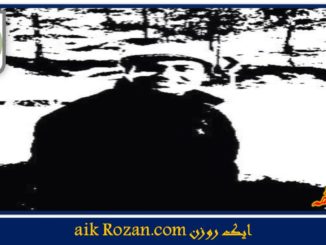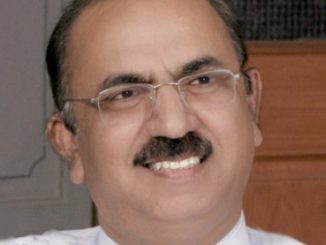
The politics of humour
(Dr Shahid Siddiqui)
As a highly political phenomenon, language is linked with power and politics. It is not just a tool of communication that is used to reflect what happens in society but is also involved in the construction of social realities and their perpetuation from one generation to another.
Keeping in view the significance of language as a tool of construction of realities, it is important to consider how powerful groups make use of this tool for hegemonic purposes. In her seminal book – titled Man Made Language – Dale Spender claims that like economic capita, men are also in control of linguistic capital. In patriarchal societies, men tend to make use of linguistic capital by reserving positive words and expressions for themselves and relatively negative expressions and connotations for women.
As a result, language is often used by powerful groups to construct glorified identities for themselves and stigmatised identities for marginalised groups. The powerful societal groups have been constantly engaged in deepening the boundaries between themselves and others. This exercise is considered to be important to keep the marginalised groups away from the power base through the process of exclusion and retain the power base in the social arena. This divide is manifested in a constant good/bad, superior/inferior, normal/abnormal, and standard/substandard basis. The powerful group in society – in this case, men – offers itself as a standard and the marginalised groups – i.e, women – are labelled as substandard and abnormal.
A number of stereotypes are constructed with the help of language. These are helpful in glorifying the identity of men and stigmatising the identity of women. This politics of labelling and naming plays a vital part in the process of exclusion. The discursive patriarchal hegemony is established and maintained on a regular basis through different social institutions – such as the family, educational institutions and the media. The patriarchal superiority is established in a subtle manner through different means. This includes songs, jokes, commercials, matrimonial ads, sayings, proverbs, fairy tales, nursery rhymes, TV plays, films and literature.
An important means of establishing superiority is through humorous Urdu poetry. Mushairas are part of the literary tradition of the Subcontinent. They are popular in the region because the Subcontinent is an orality-based society. With the passage of time, we now see exclusive humorous mushairas. In the wake of modern technology, such mushairas can now be seen on television which has drastically widened access in terms of the range of their audience.
A direct implication of the emergence of the media as a potent social institution is that socially-constructed stereotypes instantly reach a vast audience in real-time. Through YouTube, such mushairas can be accessed easily via personal computers, laptops, iPads and cellphones.
Before unpacking the politics of humour with special reference to the biased representation of women, we must understand the significant role played by humour in our lives. It is humour that provides us some bright moments. Without humour, life would be dull and boring. Humour can be broadly divided into two types: humour that is either created in a positive way without hurting others, or the one that is created at the cost of hurting others.
It is the second type of humour which needs to be studied and challenged. A major source of humour is inconsistency – i.e, something that deviates from expectations. Let us now look at the politics of humorous poetry in Urdu that is aimed at creating humour by hurting and insulting women.
It is important to understand that how some unrealistic expectations are attached with women. When they do not meet these expectations, they are ridiculed. Let us look at some of these unrealistic expectations. A common social expectation is that a woman should be beautiful. Fair complexion is a major touchstone of beauty. Dark complexion is thus gleefully ridiculed in humorous poetry.
Another expectation is that all women should be tall. This expectation emanates from the assumption that one has control over one’s height. In humourous mushairas, the short height of women is used as a source of creating humour.
Slimness is another expectation from women. This social expectation in a patriarchal society puts tremendous pressure on young girls and they desperately engage themselves in random dietary plans, which sometimes prove detrimental to their growth and health. The weight of women becomes a theme in humorous mushaira poetry.
Another unrealistic expectation is that women should always look young. This social demand transforms into societal pressure. As a result, women become conscious about their age and tend to conceal it. The deceptive treatment of their age eventually becomes another topic of humorous poetry. While talking about women, all wives are presented in humorous mushairas as dull, boring, unwanted, and tyrannical characters.
There are a number of negative stereotypes about women which are constructed by a patriarchal society and are strengthened by their excessive use in real life and through validation and legitimacy offered by different social institutions dominated by men. Such stereotypes have no scientific basis.
Some of these stereotypes claim that women are talkative, capricious, inquisitive, conscious of their appearance, relatively less intelligent and cowardly. A common stereotype constructed against wives is that they are boring.
These gendered stereotypes are strengthened through their excessive use and validation by social institutions to the extent that women tend to internalise them and consider them to be facts. As a result, language – in a subtle and mysterious way – constructs their identities. This process is carried out through ‘spontaneous consent’ by the marginalised group. On the other hand, men – especially husbands – appear in humorous mushairas poetry as simple and innocent victims who are deprived of freedom and pleasure by their ‘boring’ wives.
In order to challenge gendered stereotypes, all social institutions, family, educational institutions and the media need to play their part. As mentioned earlier, such stereotypes feed on their excessive use and legitimisation by social institutions. The electronic media should not host such humorous mushairas that promote gendered stereotypes which are biased against women and are not based on facts. Similarly, as audience and readers, we need to discourage such poetry that is hurting and insulting in its essence.
Courtesy: The News





